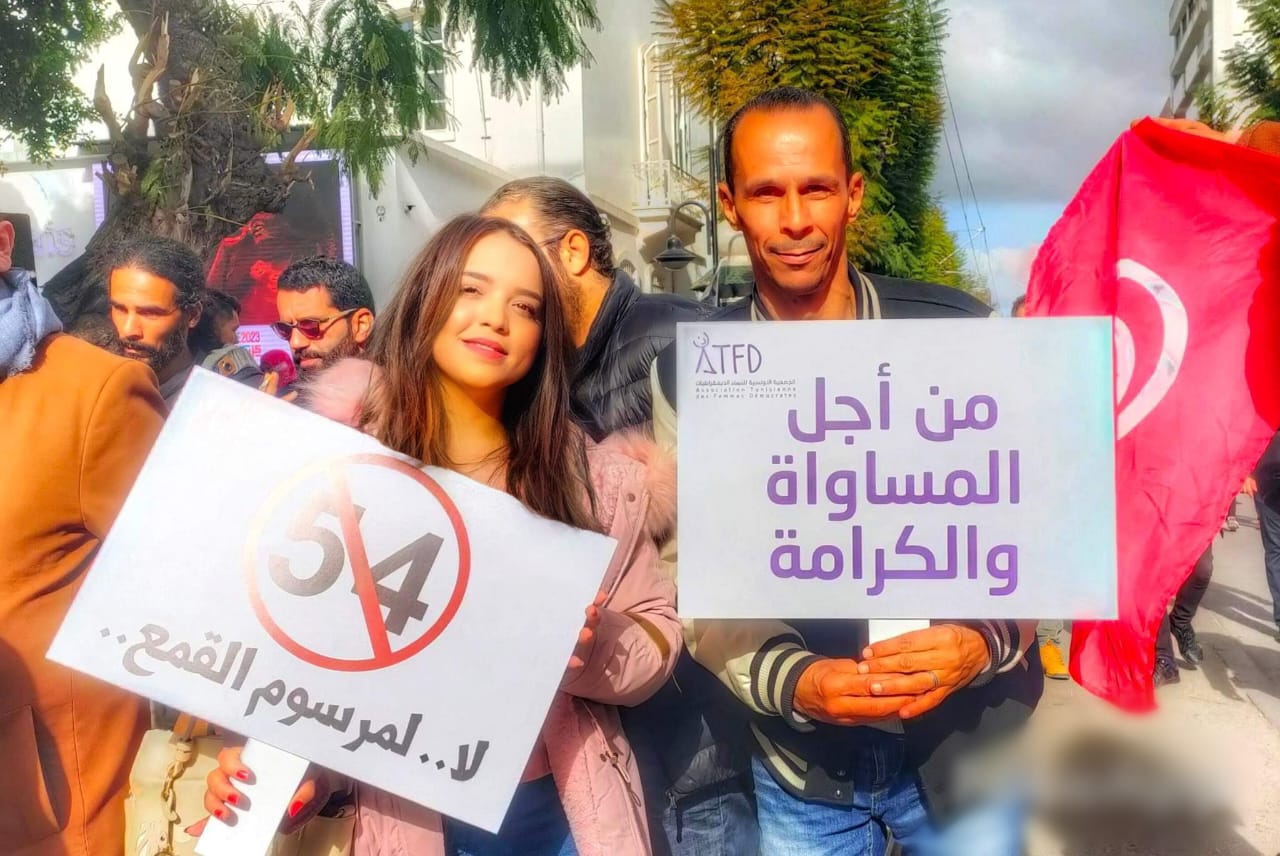This post is also available in: Français (French) العربية (Arabic)
Though the Tunisian state committed to developing women’s rights, and notwithstanding its ratification of international treaties and the 1995 Beijing Platform for Action related to “the principle of the eradication of all forms of discriminatory behavioral patterns and attitudes on the grounds of sex being priority objectives that must be undertaken for the benefit of women,” the necessity of combating stereotypical and prevailing social representations and addressing the systems that control human actions and behaviors has gone unaddressed.
In this context, the character of women’s presence in Tunisian media still indicates the prevalence of traditional social perceptions of women’s lives. Society reduces them to three prototypes: the wife, the child-bearer, or the attractive, flashy woman. This further consolidates socially prevailing gender differences through the media disseminating these stereotypes to audiences. It also voids the televised press in particular of its social responsibility to deepen public debate.
In Tunisia, the percentage of professional women journalists who have their professional badges is about 54% of the total number of journalists, according to the latest statistics issued by the National Syndicate of Tunisian Journalists. But the state’s policies to empower women in this field are shameful, especially after the democratic transition. Even though women have made a number of gains, particularly at the level of their effective participation in social, civil, and political work, they are still less visible and present than men in the field of news coverage, and programs in general.
Stereotypical representation for entertainment
Throughout the years of the democratic transition, political deliberation remained heavily masculine, despite the fact that women intensively engaged in every phase that followed the 2011 revolution for freedom, dignity, and social justice.
In this context, Fathia Al-Saidi, a Tunisian sociologist, published in March 2023 a study entitled “The image of women and their presence in the media”. This study enumerates examples of stereotypical characterizations of women, of “showy” or entertainment-centric characterizations whose only goal is to be aesthetically pleasing and excite viewers. These examples are all from the program Anti wal-Mojira that explores the life of a husband and wife. The show includes many different stereotypes that are all traditional relics.
“The stereotypical image of women in the media has come to represent the cultural patterns that are passed on from one generation to the next through an organized process of socialization, and through the media platforms that contribute, consciously or unconsciously, to the dissemination thereof”
According to Al-Saidi’s study, private TV channels adopt a purely commercial approach with little to no attention to social responsibility, making their programs and shows prone to massive criticism. This type of show has contributed to spreading a culture of “flattening,” of “fabricated laughter,” “clowning,” and “chaos,” all pervasive in the lives of viewers.
The study also finds that famous talk shows in Tunisia, especially Studio 9, are among those that perpetuate prevailing stereotypes about women and men the most. They project women as objects—never subjects. As a result, these programs continue to entrench negative images of women that reduce them to beings who only care about personal, marginal, and superficial issues and who have an exaggerated interest in their own bodies, which are always projected as mere objects of temptation.
Unfortunately, these dated and flat images are on the rise in Tunisia as channels seek to increase viewership at the expense of deeper content, human rights media principles and values, and serious gender-sensitive codes of conduct.
Al-Saidi believes that stereotypical and entertaining-superficial images are rooted in the collective imagination, and that they are the accumulation of images that stuck over the years and have come to represent the cultural patterns that are passed on from one generation to the next through an organized process of socialization, and through the media platforms that contribute, consciously or unconsciously, to the dissemination thereof. These images also reflect the absence of any sort of governance when it comes to the image of women in the media.
Unfortunately, these dated and flat images are on the rise in Tunisia…
Women as cosmetics to cover up the state of exception
After declaring the state of exception in Tunisia on 25 July 2021, a woman was appointed to head the state television corporation. But this appointment felt more like a political move, as using the image of a woman in an exceptional transitional situation has certain political goals and cannot be considered to indicate any sort of clear trend toward empowering women or strengthening their participation in decision-making positions. Rather, it stems from a desire to embellish the state of exception through the presence of a woman for smoother communication with the outside. Perhaps the decline in women’s rights in Tunisia—especially after dispensing with the principle of parity in election candidacy—is the greatest indicator of the lack of real will of the current government to develop effective policy to support universal women’s rights.
State television has 1,079 direct employees in the corporation’s various departments, of whom only 318 are women and 761 are men.
Union representation: men have “twice the luck” of women
Finally, the 2020 elections for the Fifth National Congress of the National Syndicate of Tunisian Journalists resulted in an executive office dominated by men, with 6 men for every 3 women, which is very much below parity. And although Amira Mohamed was the one who won the largest percentage of votes, the syndicate’s internal vote prevented her from assuming the position of president, relegating her to vice president.
Since 2008, the date the National Syndicate of Tunisian Journalists took on its current form, only once has a woman assumed the presidency of the syndicate, versus two men, over the course of 5 syndicate electoral cycles.































